
Please Please Me is the debut studio album by the English rock band the Beatles. Parlophone rush-released the album on 22 March 1963 in the United Kingdom to capitalise on the success of the band's singles "Please Please Me" and "Love Me Do". The album topped Record Retailer's LP chart for 30 weeks, an unprecedented achievement for a pop album at that time.

Talk Talk were an English band formed in 1981, led by Mark Hollis, Lee Harris (drums), and Paul Webb (bass). The group achieved early chart success with the synth-pop singles "Talk Talk" (1982), "It's My Life", and "Such a Shame" before moving towards more experimental music in the mid-1980s, pioneering what became known as post-rock. Talk Talk achieved widespread critical success in Europe and the UK with the singles "Life's What You Make It" (1985), and "Living in Another World" (1986), and in 1988 they released their fourth album Spirit of Eden, which was critically acclaimed yet commercially less successful.
The United Kingdom held a televised national pre-selection broadcast on BBC1 to choose the song that would go to the Eurovision Song Contest 1969 with Scottish singer Lulu chosen to represent the UK. After performing all six songs weekly on her eponymous TV series Lulu, the final was held on 22 February 1969 and presented by Michael Aspel. Of the six finalists, song No.4, I Can't Go On Living Without You, was written by Elton John and Bernie Taupin, before both found songwriting fame. John recorded the track as a demo which later became available on CD. Andrew Lloyd Webber and Tim Rice also submitted a song called Try It and See but this failed to reach the final. They later reworked the track and it became King Herod's Song in the musical Jesus Christ Superstar.
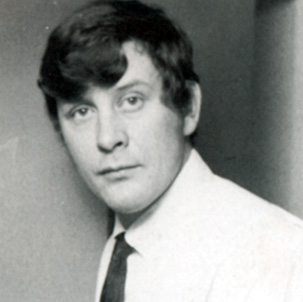
Mickie Most was an English record producer behind scores of hit singles for acts such as the Animals, Herman's Hermits, the Nashville Teens, Donovan, Lulu, Suzi Quatro, Hot Chocolate, Arrows, Racey, and the Jeff Beck Group, often issued on his own RAK Records label.
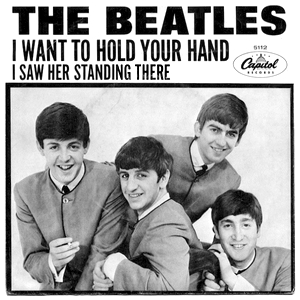
"I Want to Hold Your Hand" is a song by the English rock band the Beatles. Written by John Lennon and Paul McCartney, and recorded in October 1963, it was the first Beatles record to be made using four-track equipment.

A Collection of Beatles Oldies is a compilation album by the English rock band the Beatles. Released in the United Kingdom in December 1966, it features hit singles and other songs issued by the group between 1963 and 1966. The compilation served as a stopgap release to satisfy EMI's demand for product during the Christmas period, since the Beatles had only begun recording Sgt. Pepper's Lonely Hearts Club Band, the follow-up to their Revolver album, late the previous month. It was the band's first official greatest hits collection, although the Beatles had no involvement in the album.
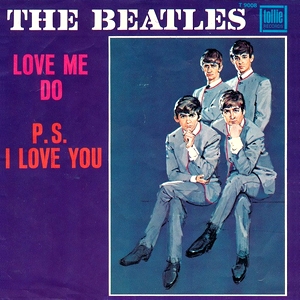
"Love Me Do" is the debut single by the English rock band The Beatles, backed by "P.S. I Love You". When the single was originally released in the United Kingdom on 5 October 1962, it peaked at number 17. In 1982 it was re-promoted and reached number four. It was released in the United States in 1964, where it became a number one hit.
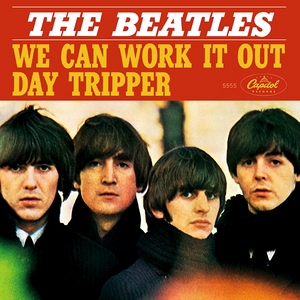
"Day Tripper" is a song by the English rock band the Beatles that was released as a double A-side single with "We Can Work It Out" in December 1965. Written primarily by John Lennon, it was credited to the Lennon–McCartney partnership. Both songs were recorded during the sessions for the band's Rubber Soul album. The single topped charts in Britain, Ireland, the Netherlands and Norway. In the United States, "Day Tripper" peaked at number five on the Billboard Hot 100 chart while "We Can Work It Out" held the top position.

Art Brut are a Berlin-based English and German indie rock band. Their debut album, Bang Bang Rock & Roll, was released on 30 May 2005, with its follow up, It's a Bit Complicated, released on 25 June 2007. Named after French painter Jean Dubuffet's definition of outsider art - art by prisoners, loners, the mentally ill, and other marginalized people, and made without thought to imitation or presentation - South London's Art Brut were tagged by NME as part of the "Art Wave" scene that also included bands such as The Rakes, Franz Ferdinand and Bloc Party. The band released further albums, Art Brut vs Satan in 2009 and Brilliant! Tragic! in 2011. A fifth album, Wham! Bang! Pow! Let's Rock Out!", was released in 2018.
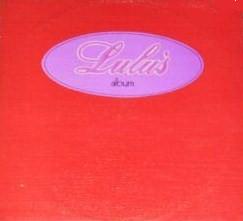
Lulu's Album is an album by British pop singer Lulu, released in 1969. Despite promotion from her TV show, Lulu and recently winning the Eurovision Song Contest, this album failed to chart. Her biggest British solo hit, Eurovision winner Boom Bang-a-Bang, was not included on the album despite recently hitting No.2 in the UK singles chart. The song that placed 3rd in the A Song for Europe heats, Come September was featured on the track list. It was her last album with producer Mickie Most, who had guided her career successfully through the late 1960s. Lulu's Album contained an array of cover versions from recent pop and rock hits, which was common practice for many female artists at this point. Following this, Lulu was to change musical style for the next few years to a more credible and mature approach.
"I Could Never Miss You " was the fourth and final US Top 40 hit for Lulu.

Don't Take Love For Granted is an album released in the autumn of 1978 by Lulu on Elton John's label, The Rocket Record Company.

Lulu is an eponymous album released by Lulu on Alfa Records in 1981. It is notable for containing the hit single "I Could Never Miss You ", which became the second-highest-charting single of Lulu's career in the US, hitting the top 20 on the Billboard Hot 100 and No. 2 on the Adult Contemporary chart in 1981.
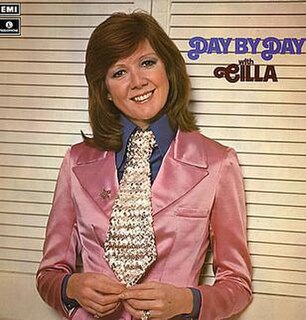
Day by Day with Cilla is the title of Cilla Black's seventh solo studio album released in 1973 by Parlophone Records. The album marked the end of a significant era in Black's recording career as it was her last project to be produced by George Martin, who had worked on all of her recordings since her 1963 debut. It was also Black's final record released on the Parlophone Records label.

The Shirley Bassey Collection is a double compilation album released in 1972 by British singer Shirley Bassey. The album charted at #37 in the UK charts in January 1972.
Mark London is a Canadian born British soundtrack composer, songwriter and music producer. He is perhaps best known as composer of the song "To Sir, with love".

Tracks ‘n Grooves is a studio album by British singer Cliff Richard, released November 1970 on EMI Columbia label. It reached #37 in the UK Album Charts.
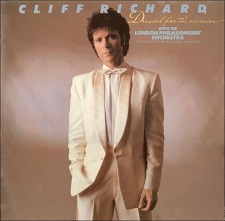
Dressed for the Occasion is an album by English singer Cliff Richard, recorded live with the accompaniment of the London Philharmonic Orchestra at the Royal Albert Hall in November 1982. It was released in May 1983 on the EMI label and reached No. 7 in the UK Albums Chart and No. 30 in Australia. It was certified Silver in the UK.

25th Anniversary Album is a compilation album by Shirley Bassey. Released in 1978 to mark her 25th year in show business, the album was a double set, comprising 40 tracks. The songs included span just 20 of the 25 years from 1957 to 1976, however, her first professional contract is dated 1953. Bassey had toured extensively throughout 1978 to mark her 25 years. This collection, including her biggest hits and some lesser-known recordings, became one of her biggest in the UK, where it reached No.3 and spent 12 weeks on the album chart.



















